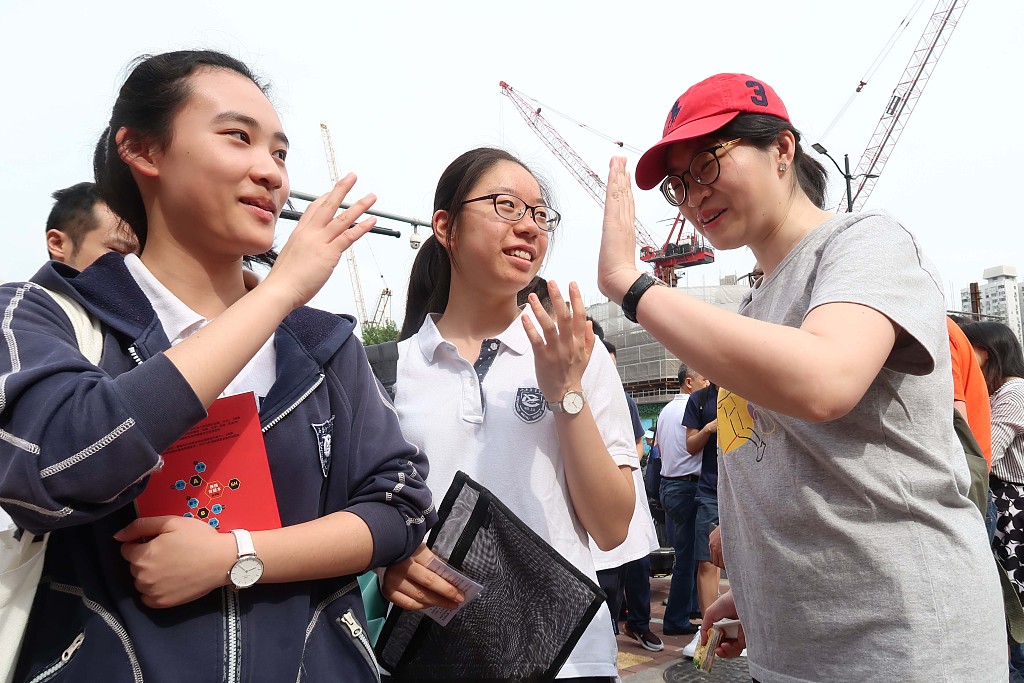Shanghai teacher credentials improving
By CAO CHEN and HE QI in Shanghai | China Daily | Updated: 2019-07-05 08:08

An international poll has revealed that almost all surveyed Shanghai junior high school teachers-more than 99 percent of those surveyed in the city-hold a bachelor's degree. Meanwhile, the city encourages teachers to have lifelong training to nurture more qualified staff for better teaching quality, experts said.
The Teaching and Learning International Survey report, released by the Organization for Economic Cooperation and Development (OECD) on June 19, covered over 240,000 middle school teachers and school leaders in 48 countries worldwide. Shanghai was the only Chinese region involved in the survey, with around 4,200 junior high school teachers and principals from 200 schools selected to participate.
Experts said Shanghai junior high school teachers' academic qualifications have been improving over the past several decades. According to Zhang Yao, an English teacher at Shanghai Experimental School, most junior high teachers had obtained associate's or bachelor's degrees when she started her career in the 1990s.
"But now, nearly half my colleagues who teach junior high courses hold a master's degree or have embarked on one while working," she said.
"Schools need more qualified and educated teachers to nurture students in a better way and to positively impact students' attitudes and behaviors."
The 45-year-old Zhang was an example. She completed her postgraduate studies while working full-time and received her master's degree in education management at Shanghai Normal University five years ago.
She said higher education nurtures one's systematic thinking ability, which is a basic requirement to be a good teacher, although that's not absolutely true for every case.
However, Zhang added, there are also teachers without higher education experience that have the characteristics-such as the ability to maximize students' potential, exhibiting a strong work ethic and demonstrating critical thinking-that a good teacher requires.
"These qualities can also be achieved through training at work and years of job experience," she said.
In Shanghai, at least 99 percent of Shanghai principals have a bachelor's degree, the report said. But only 18.1 percent of them possess a master's degree or higher, compared to the OECD average of 66.3 percent.
Still, the survey found that Shanghai principals were better trained for their roles than those surveyed in other countries and regions.
Only 3.1 percent said they never received any training related to school management, teaching or instructional leadership, the lowest among all participating OECD countries and regions.
"Postgraduate study, for me, is the best training of logical thinking, research ability and leadership," said Li Baiyan, principal at Shanghai Jianping Experimental Middle School.
The 49-year-old Li received a master's degree in education at East China Normal University in 2012 and is pursuing a doctorate.
Li suggested young and middle-aged teachers and school leaders, if possible, pursue a higher degree to be better prepared for their future career and enhance their professional quality.
She also noted the city offers comprehensive continuous professional development cultivation through training programs customized for young and senior teachers and school leaders.
According to the Shanghai Municipal Educational Commission, a complete training system is accessible to teachers at local primary and middle schools, where thousands of courses covering teacher ethics, teaching skills and practices are available for educators.
The government also offers outstanding school leaders and teachers international exchange programs to visit and learn from overseas partner schools, universities and institutions.
"I expect more communication can be made between Shanghai middle school leaders and those in other regions," Li added.
"Effective professional training enhances teachers' job satisfaction, which is backed up by the data showing that 87 percent of Shanghai teachers said they benefited from training, higher than the OECD average (82 percent)," said Ding Gang from the institute for advanced studies in education at East China Normal University.
"Lifelong learning is something all educators should keep in mind, to constantly acquire new professional knowledge, skills and concepts in education," said Zhang Minxuan, who is in charge of the survey in Shanghai and director of the Research Institute of International and Comparative Education at Shanghai Normal University.
























